Playback
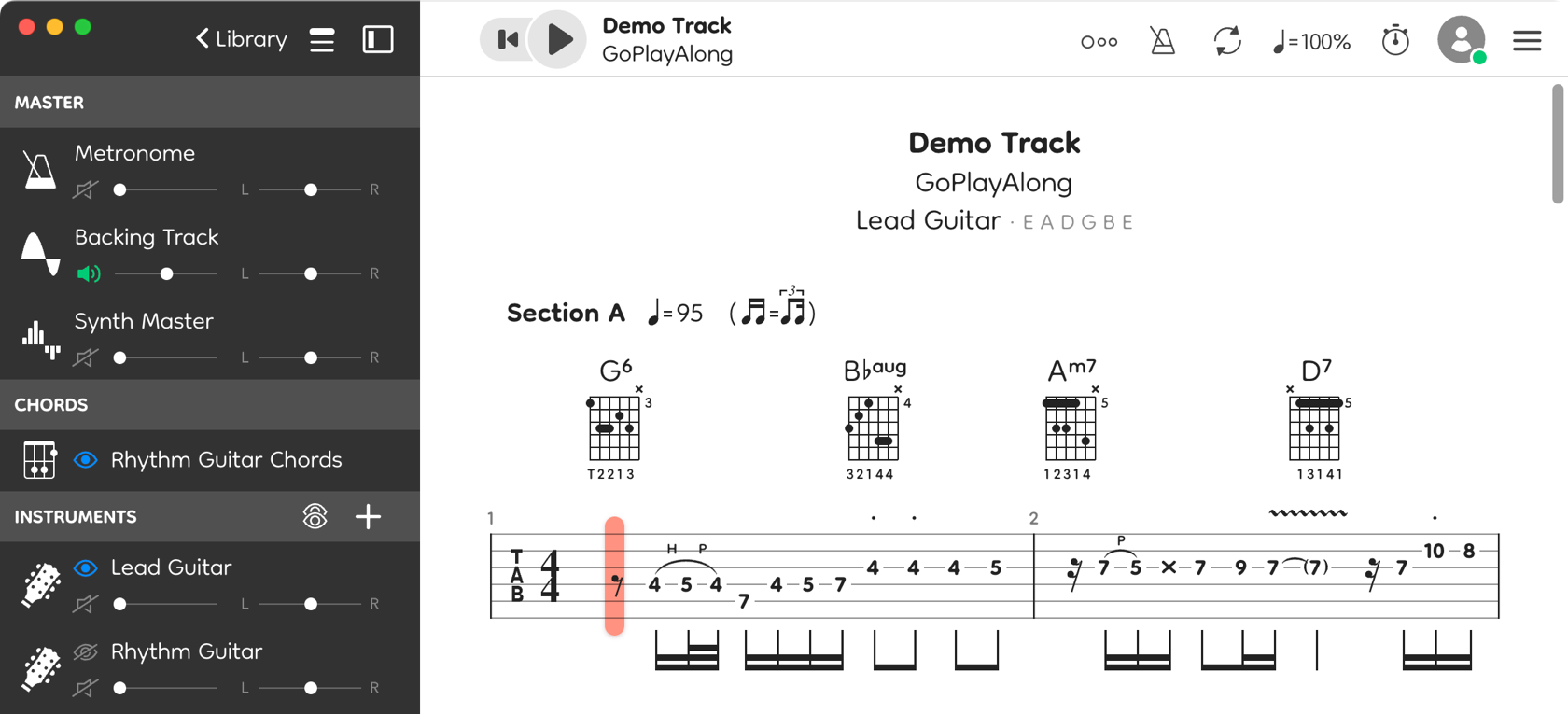
Select a song from the library and hit
When you load a song for the first time, GoPlayAlong automatically syncs the score with its associated audio file. If needed, you can manually re-sync the score at any time by entering manual sync mode.
Score layout
The left sidebar shows all instruments available in the tab file.
Click on an instrument icon to show it in the score view.
Alternatively, use the
Instrument notation
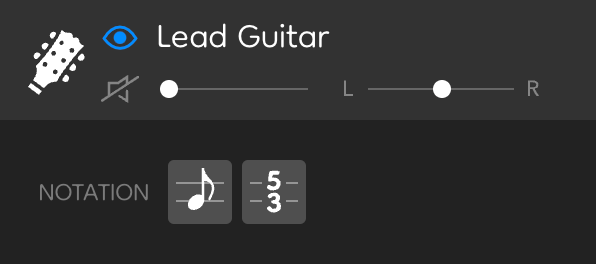
Clicking an instrument in the sidebar expands a settings panel with notation options. Stringed instruments can be shown in standard notation, tablature, or both.
When you change notation settings, a star icon appears next to the notation selector. Click the star to save your preferences as the default for all future songs.
Multitrack view
To view multiple instruments in your layout, click the multitrack icon in the Instruments header. In multitrack view, click any instrument to add or remove it from the layout.

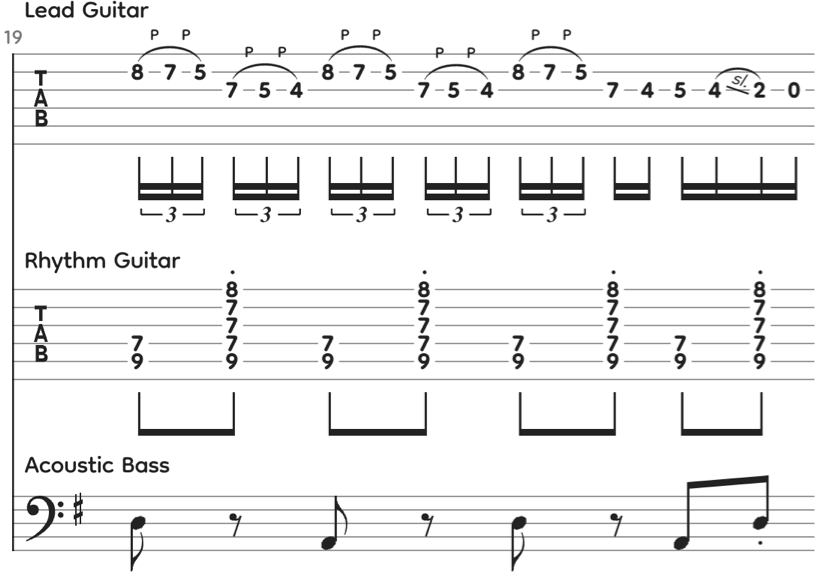
Combine instrument tracks
Use the Mixed Tracks feature to combine multiple instrument staves into one. This feature is especially useful when a score part you want to play is split across multiple tracks in the transcription.

To create a mixed track, click the Plus icon in the Instruments header.

Then at any position in the score, click the Change instrument icon under the mixed track Actions.
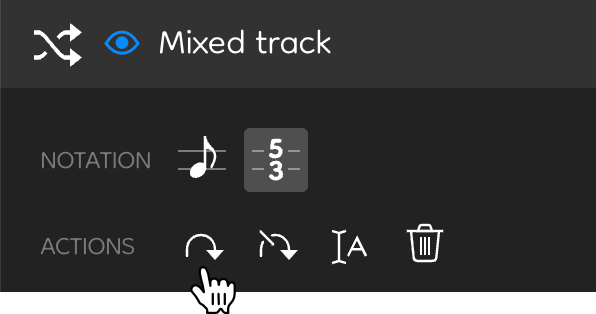
To undo an instrument change, click the Clear instrument change icon under the mixed track Actions.
Chords and lyrics
If the tab file includes chord or lyric tracks, they’ll also appear in the sidebar. Although these tracks are usually linked to a specific instrument, GoPlayAlong allows you to show chords and lyrics (when available) for any instrument in the score view.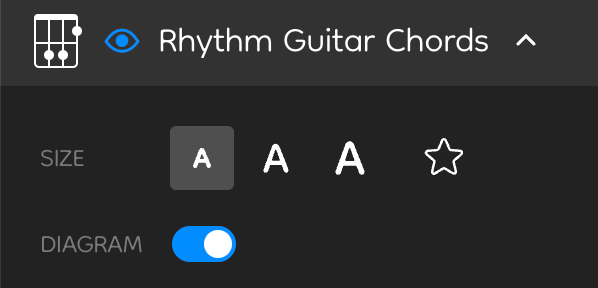
Expand the chord or lyric track to adjust settings such as size or to toggle chord diagrams.
Customize notation
Go to Preferences > Notation to find more options for customizing the score layout.
Mixing audio
GoPlayAlong lets you mix different audio sources during playback. In the Master section of the left sidebar, you’ll find the three main sources: the metronome, the backing track, and the synth version of your tab.
Below the Instruments section, you can also find individual volume and pan controls for each instrument in the tab file.
To mute or unmute a track, click the loudspeaker icon next to its icon.
Use the mixer to spot mistakes in your score. Play the backing track and synth master together, panning the backing track left and the synth master right. This makes it easier to hear differences between your tab and the original audio.
Add backing tracks
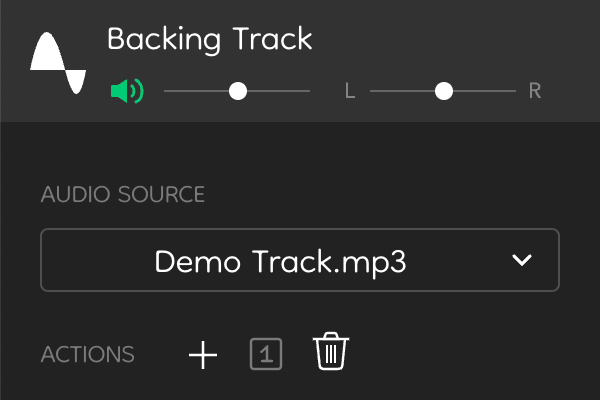
GoPlayAlong supports multiple backing tracks per song. To add a new backing track, expand the Backing Track section in the sidebar, then click the Plus button next to Actions.
When a song has multiple audio tracks, secondary tracks use the sync data from the primary track by default. When needed, you can sync each audio track independently in manual sync mode.
Remove backing tracks
To remove the current backing track, expand the Backing Track section in the sidebar, then click the Trash button next to Actions.
Transpose audio
If the backing track is in a different key than your tab, expand the Backing Track section in the sidebar and use the Pitch slider to shift it up or down in semitone steps. For finer adjustments, drag the Cents slider.
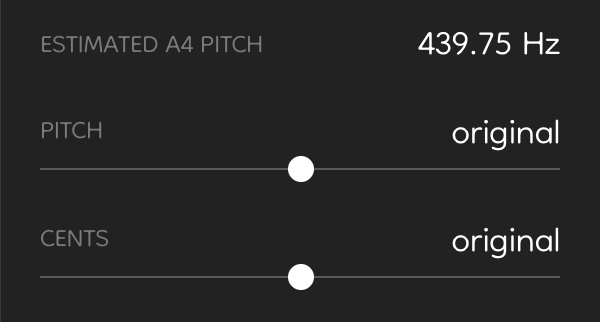
Practice tools
The toolbar above the score view offers various practice tools to help you learn and play along with your songs.
Count-off
Activate count-off to pick up the tempo before playback starts. To change the count-off settings, hover over the count-off icon and click Customize.
The count-off settings you can adjust:
- Beat accent and interval to define how metronome beats sound during the count-off
- Count-off duration (1 or 2 bars)
- Skip even beats in the first bar (when using 2 bars)
- Cinematic-style visual count-off
- Mute last beat to avoid noise in recordings
Changes to count-off settings are saved either per-song or globally:
- Per-song: Beat accent and interval settings are saved per-song, since different song structures may require unique patterns.
- Global: All other settings
Metronome
Activate the metronome to play a steady beat during playback. To change beat accent and interval settings, hover over the metronome icon and click Customize.
To change the metronome volume, select the metronome icon in the sidebar and adjust the volume slider.
Loop selection
Click the loop icon to toggle loop playback. Drag the loop handles in the score view to select a section to loop.
If you often repeat a section of a song, consider saving it as a Riff to access it quickly.
Playback speed
Click the tempo icon to open the speed control panel. Here you can slow down or speed up playback without affecting the pitch of the audio.
Tempo trainer
The tempo trainer helps you gradually increase the playback speed over multiple repetitions. Click the stopwatch icon to open the tempo trainer panel.
Riffs
Save any part of the score as a riff to remember and practice later.
Create a riff
Select a section of the score by dragging the loop handles. Then, click the Plus button in the left sidebar, next to the Riffs section.

Once a riff is created, it appears in the Riffs section of the sidebar.
Play a riff
Click a riff in the sidebar to load it in the score view. GoPlayAlong will enter into riffs mode, where only the selected riff is shown.
Edit or delete a riff
Select a riff in the sidebar, then click the Edit icon to change its name or loop points. Click the Delete icon to remove the riff.
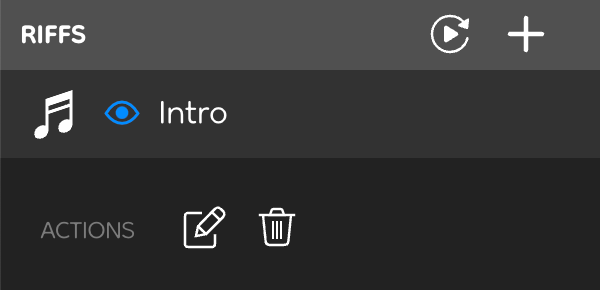
Exit riffs mode
To exit riffs mode and return to the full score view, click the Riffs mode switch at the header.
